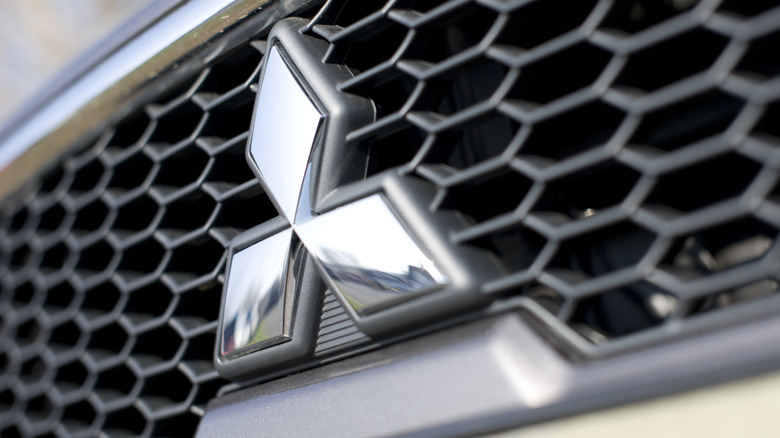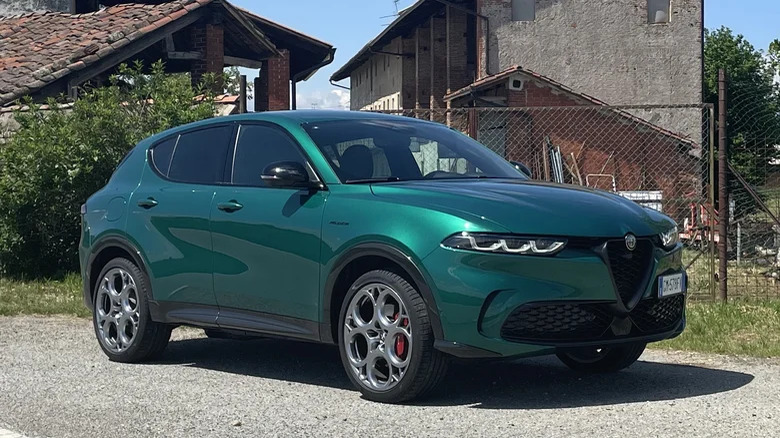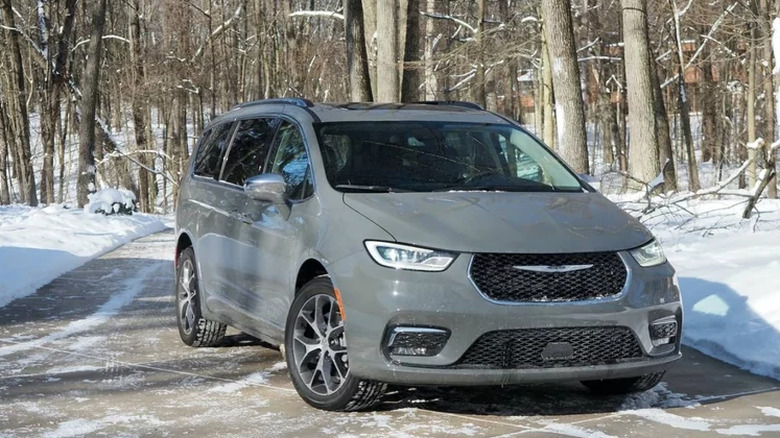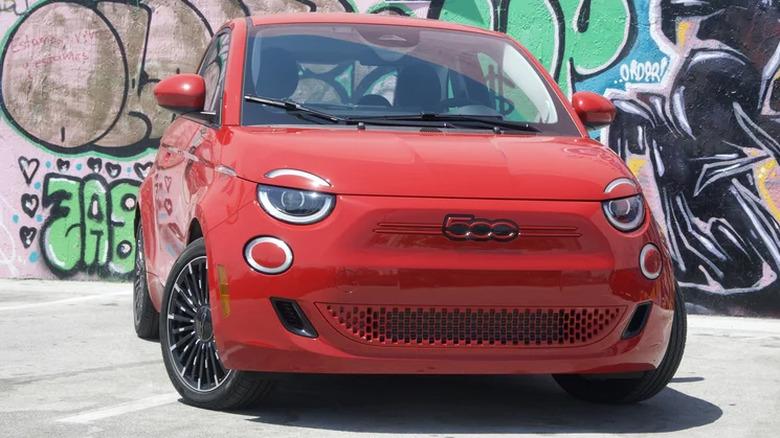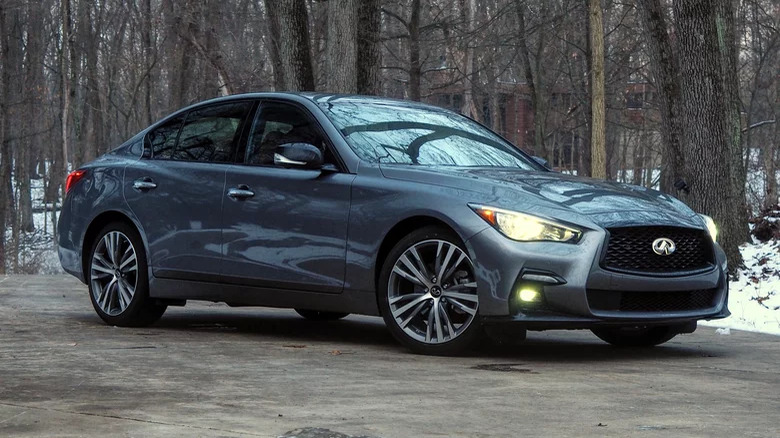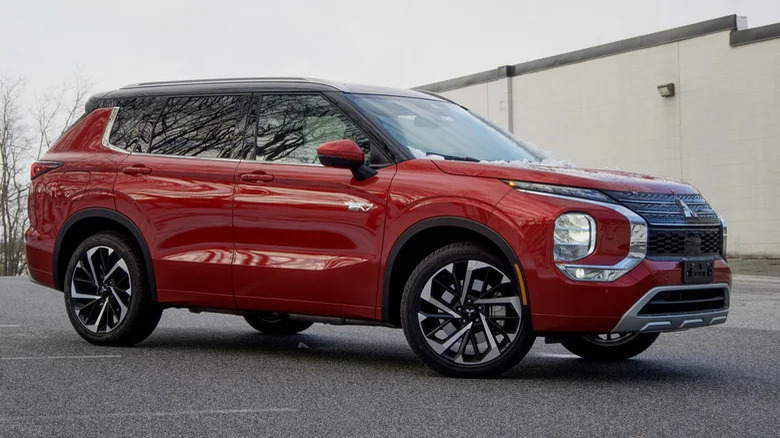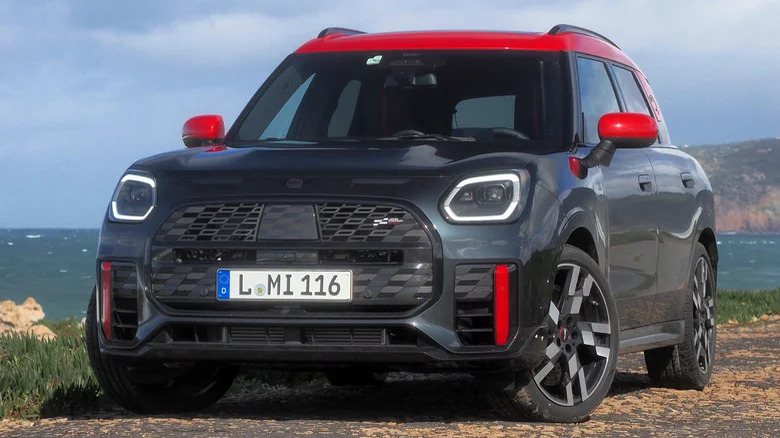Doug DeMuro Thinks These 6 Car Brands Are Headed For Failure
The automotive industry is pretty volatile, and over the years we've seen many iconic badges disappear. Pontiac, Saturn, Mercury, Oldsmobile and Saab are among the names that used to be common on the roads, but are now lying dormant in the business equivalent of a junkyard. Even mammoths of the industry like Ford and GM have been on shaky financial ground at one point or another.
Which manufacturers are likely to go next? It's inevitable that some will go bust sooner or later. Doug DeMuro, who runs one of the most popular automotive channels on YouTube, bases his opinions on the brands' current lineup, buying trends, and a few other factors that could be make or break for a manufacturer.
It's important to note that DeMuro's video is essentially focused on the U.S. market. Most of the brands mentioned are doing very well in other countries, and the chances of most of them failing globally is minimal. So by "failure," DeMuro means that the brands will simply stop selling cars in the U.S. Here are the six predictions that the YouTube star is pretty confident about, along with one that could go either way.
Alfa Romeo
DeMuro's first pick, Alfa Romeo, has "failed" in the United States before. Like many European manufacturers, a mix of declining sales and restrictive legislation saw it bow out of the U.S. market in the mid '90s. That hiatus lasted over two decades before Alfa came back with a bang back in 2015. DeMuro points out the company returned with the 4C, Giulia, and Stelvio, which caused a bit of a stir at the time. According to the YouTuber, this could be when the company's second stint actually peaked.
The renowned vehicle vlogger puts Alfa in direct competition with BMW, and claims that the Italian marque's offerings were keeping pace with its German competition for a while. This includes praise for the Stelvio, which he describes as the "best handling SUV" he had ever driven back when he first tried one. However, BMW's constant innovation and reinvention when it comes to things like the 3 Series has allowed Alfa Romeo's main competition to pull ahead.
For the most part, the Italian brand has had the same offering since it returned — minus the 4C, as offering a fun little sports car wasn't in the long-term game plan for some reason. There is one exception, and that's the Tonale. However, DeMuro does point out that this is essentially a Dodge Hornet with an Alfa badge on it — albeit with small differences and not on the same platform. While DeMuro believes Alfa Romeo could've been successful with the right funding and "a BMW-like lineup," the investment simply isn't there and the badge doesn't seem to be central to Stellantis' plans. That may be a sign Alfa will be exiting the U.S. market again soon.
Buick
Buick can trace its history back to the 19th century, with the brand being one of the founding members of General Motors. Despite this, Doug DeMuro believes that Buick's days may be numbered in the U.S. market because it simply isn't needed. GM, which owns Buick along with GMC, Chevrolet, and Cadillac, has many of its bases covered in the premium and luxury markets. Each of these brands comes with a good range of vehicles and offers something somewhat unique. Buick, as DeMuro puts it, has a handful of crossovers — none of which are "all that compelling."
DeMuro alludes to a relatively common line of thinking when it comes to Buick. The brand basically exists because it sells well in China. However, he also points out that Buick's range of vehicles is totally different in the Chinese market, and suggests GM focuses on that.
The YouTuber does mention how Buick has tried to reinvent itself several times over the years in an attempt to appeal to different demographics. This includes an effort to come across as "the hip, fun, brand" in DeMuro's words. However, bluntly put, it hasn't really worked out. People just aren't that interested. DeMuro suggests killing off Buick in the U.S. and repurposing its lineup as Chevrolets or entry-level Cadillacs. It's continued existence as an independent brand makes no sense to him.
Chrysler
Chrysler is one of the most historic American vehicle brands, so any suggestion that it could go the same way as Pontiac, Oldsmobile, or any of the other formerly big names currently residing in the automotive graveyard may seem quite silly. It's not that far fetched: As DeMuro points out, Chrysler's badge is only attached to one vehicle these days — the Pacifica. Said vehicle is marketed with two powertrain options, but beyond choosing a gas-powered minivan or a plug-in hybrid version, there really isn't anything to pick from.
Until recently, the Pacifica was sold alongside the 300 sedan and another minivan — the Chrysler Voyager. With those having been discontinued, the Pacifica remains as the last vehicle standing. The Pacifica does sell relatively well, and this is part of what may be keeping Chrysler afloat. However, DeMuro points out that you could slap a Dodge badge on it and sell it as the Grand Caravan again. This would negate the need for Chrysler entirely, and would save Stellantis the trouble of marketing and catering for a whole extra brand.
DeMuro makes a point of highlighting just how many brands Stellantis — the company that owns Chrysler — is juggling. He even makes a distinction when it comes to the Dodge RAM, making the case that "RAM" is now its own brand. He then goes on to make the case for streamlining things, cutting apparently dead weight like Chrysler, and focusing efforts on successful marques like Dodge.
Fiat
Fiat, yet another Stellantis brand, is a major automotive manufacturer with a long and storied history. That history includes a major stake in Ferrari, which when paired with a few hundred spare engines, ultimately led to the production of the legendary Fiat Dino. However, Fiat isn't currently offering anything that unique in the United States, and this could ultimately be the cause of its downfall.
As DeMuro highlights, Fiat has really gone all in on the 500 — a sub-compact car. The vehicle was fairly popular at launch, but profit margins are smaller on compacts, and they don't tend to do well in the current market. Other companies are ditching compact offerings, with the likes of the Mitsubishi Mirage and Suzuki Swift being discontinued in recent years in favor of ever-popular SUVs.
Fiat has offered other vehicles in recent years, including the well regarded 124 Spider and various variations of the 500 — including an electric version. But as things stand, a few flavors of the small compact are all the Italian icon has to offer. Still, things could be worse. Fiat could have the Multipla in its lineup, which if you base it on looks alone would actually be worse than nothing.
Infiniti
Asian luxury vehicles are doing pretty well in the United States. Lexus, Toyota's luxury arm, is still going strong. Genesis, Hyundai's top-end offering, is enjoying its best years yet. The same can't really be said for Infiniti, which is responsible for providing high-end versions of Nissan's offerings.
DeMuro points out Infiniti was doing pretty well in the early 2000s, but as things stand, it "doesn't really make any compelling vehicles." Matters were made worse by an inability to follow up on vehicles like the G35 and the FX. A rebrand around 10 years after the company's golden period further distanced Infiniti from its glory days.
DeMuro compares Infiniti to the likes of Lexus and BMW to highlight how things have gone wrong at the Japanese luxury brand. The YouTuber claims that the likes of Lexus offer what appear to be total redesigns of Toyota models, without ramping up costs that much. As a result, profit margins are very healthy. This, according to DeMuro, is something Nissan is not achieving with Infiniti.
He also uses BMW as an example of a luxury brand that is doing very well, pointing towards the innovations that the German automaker constantly makes. With the right amount of investment, DeMuro predicts that Infiniti could turn things around and do very well. However, he seriously doubts Nissan's willingness to throw the necessary money at its luxury department. He then seems to suggest that Infiniti just plods on with its "non-compelling" lineup year after year.
Mitsubishi
In the 1990s and early 2000s, Mitsubishi produced one of the greatest rally cars ever to exist. If you grew up fawning over the Lancer Evo, then it may be difficult to believe that the company behind it may be eyeing up an exit from the world's second largest automotive market. Unfortunately, the Lancer is no more — and if DeMuro is to be believed, then Mitsubishi itself may not be far behind it.
One particularly biting bit of criticism centers on the Outlander. It's one of the best-sellers in Mitsubishi's current crop, but DeMuro insinuates it's only really there for people who can't afford or can't find a Toyota RAV4 Prime PHEV. He follows this up by saying "perpetual second choice" isn't what any automaker wants to be, but "it's just what Mitsubishi is."
DeMuro mentions the relative success of the Mirage, while also pointing out that it's a very low margin car, and won't have made Mitsubishi much money. He also points out that the Mirage receives a lot of criticism and ridicule, and he has even made videos criticizing it on his own channel. All of this may be irrelevant, as the Mirage was discontinued in 2024, one of many compacts essentially being phased out in the U.S. due to declining sales.
As with other manufacturers, DeMuro criticizes Mitsubishi's lack of "inspiring" vehicles, and points towards how the manufacturer has struggled to gain any real traction in the United States, despite being around since the 1980s. He concludes by saying that Mitsubishi "has no real reason to be here," which in turn suggests that the company's withdrawal from the U.S. market is going to happen eventually.
DeMuro believes there's a chance Mini may go too
Despite heavy praise of BMW becoming a running theme throughout DeMuro's video, his last prediction centers on one of the German automaker's best known brands. Mini has a heritage stretching back to the 1950s, and has been owned by the Germans since the early 2000s. The vehicles produced between BMW's takeover and around 2015 are the base DeMuro's argument is built on.
Those post-takeover Minis somehow managed to appeal to everyone. Enthusiasts loved the go-kart like handling, people in the cities like things that are easy to park, and folks who want something safe and cute found an ideal option. As DeMuro says, though, if you're trading on nostalgia you may struggle to look forwards. Attempts at reinvention have generally involved small SUVs like the Mini Clubman and Countryman. Those vehicles saw some success, but apparently not as much as their predecessors.
Minis are also quite expensive now, which may have a huge impact on sales. Many drivers see a Mini Cooper as a third car — not practical enough to shift a lot of baggage or a bunch of adult passengers, but a fun little run around you can take out on the weekend. Unfortunately, people may not want to break the bank on a third car. If sales decline significantly, BMW might pull the Mini brand from the United States entirely.
Although there is some logic to DeMuro's argument, he himself seems very unsure when it comes to Mini's chances of failure. It's certainly the least confident pick the YouTuber made during the video. Mini also announced a new platform in early 2024, so don't be shocked to see the formerly small vehicles in the U.S. market for a long time to come.
